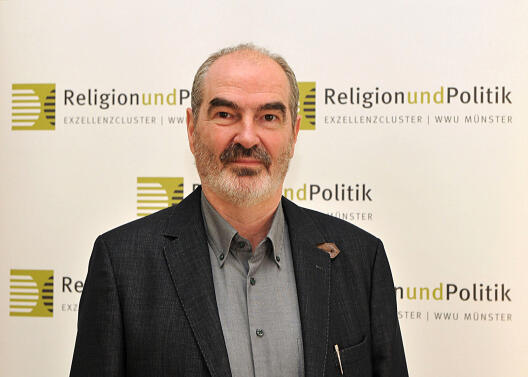Reflecting on Theological Essentials in an Interreligious Way
Theological Trialogue among Buddhist, Christian and Muslim Scholars in Washington

Researchers from all over the world will meet from June 27th – 29th in Washington for the third session of the first theological trialogue ever between Buddhists, Muslims and Christians. At Georgetown University they will discuss concepts of salvific action, as the theologian and religious studies scholar Prof. Dr. Perry Schmidt-Leukel of the Cluster of Excellence explains. After the first two meetings in Kyoto and Muenster, both in 2017, about twenty specialists from Japan, USA, Thailand, Vietnam, Turkey and Germany will convene for the third time for a joint reflection on issues of faith and practice in the three traditions. The Washington symposium is organized by the internationally renowned Roman-Catholic theologian Professor Peter Phan who is a member of Georgetown University.
Together with the Japanese expert on Shin Buddhism, Prof. Dr. Dennis Hirota from the Ryukoku University in Kyoto, Perry Schmidt-Leukel initiated the trialogue project, which is called “Shin Buddhism, Christianity, Islam: conversations in Comparative Theology.” Four members of Muenster University (WWU) will join the symposium: apart from Perry Schmidt-Leukel, Professor Mouhanad Khorchide (Cluster of Excellence “Religion Politics”) and the two junior researchers Elif Emirahmetoglu (Religious Studies) and Daniel Rumel (Catholic Theology). “Doing theology in an interreligious way,” says Schmidt-Leukel, “aims at developing new forms of theological reflection and integrating insights from other religions into one’s own tradition.” During the first two meetings in Kyoto and Muenster, the participating scholars discussed foundational theological concepts, such as transcendence and revelation, followed by a discussion on the understanding of human existence and the problem of evil in Shin Buddhism, Christianity and Islam. In their trialogue, the scholars employ the method of “comparative theology”; that is, each topic is dealt with by a Christian, a Buddhist and a Muslim leading to a longer conversation and reflection among the whole group.
Salvation/Liberation and Religious Practice
The topic of the third symposium is “salvific action.” The participants will address the question of how Christianity, Islam and Shin Buddhism understand the experience and mediation of salvation/liberation. “We inquire about the role of transcendent reality in what is seen as human salvation or liberation and about the role of religious practice,” explains Perry Schmidt-Leukel. One aspect of the symposium will be how in the different traditions the concepts of salvation and liberation are interconnected with morally good behavior and salvific action in the world. This includes the question of how, according to the three traditions, human beings should relate themselves to a world in which evil is omnipresent.
The symposium will be opened by a public event. The Roman-Catholic theologian Professor Leo Lefebure from Georgetown University will give a lecture on “‘Go, tell it on the Mountain:’ Salvific action in the light of African-American Christian experience.” The Japanese scholar of Shin Buddhism Professor Dennis Hirota from Ryukoku University will speak on “Learning from others: Engaging the Shin Buddhist path in the contemporary world.” The lectures and the subsequent discussion with the audience will be chaired by Professor Perry Schmidt-Leukel.
Predecessor of the Theological Trialogue
The predecessor of the trialogue is a Christian-Buddhist dialogue that was initiated by a group affiliated with the Protestant theologian John Cobb and the Buddhist scholar of religious studies Masao Abe between 1984 and 2004 with a series of first-class international conferences, as Prof. Schmidt-Leukel explains. They were primarily dedicated to the dialogue between Christian theologians and Buddhist thinkers from Zen Buddhism, partly opening up towards Jewish theologians. “We want to revive this tradition, but provide a new shape in a twofold manner: on one hand, the largest branch of Japanese Buddhism is involved, and this is Shin Buddhism, not Zen. On the other hand, we have extended the dialogue to a trialogue, in which Muslim theologians take part on all levels.”(exc)

